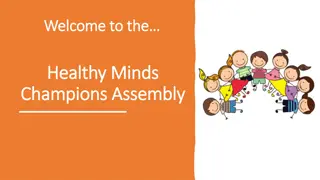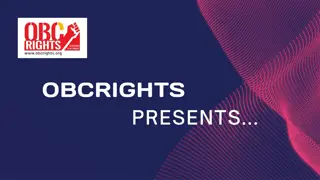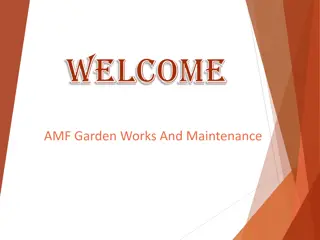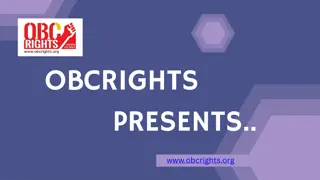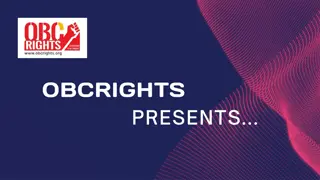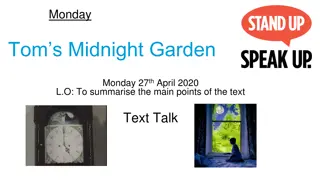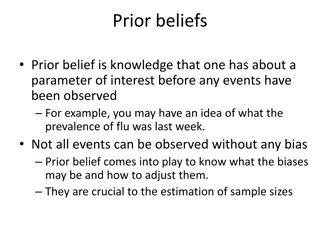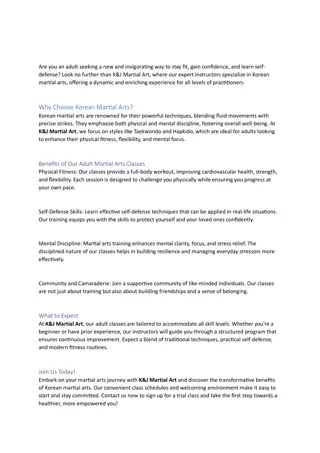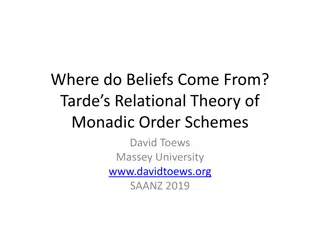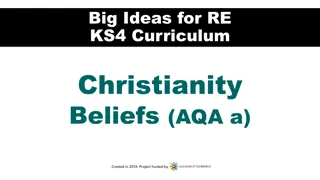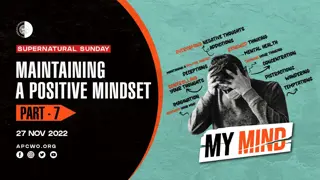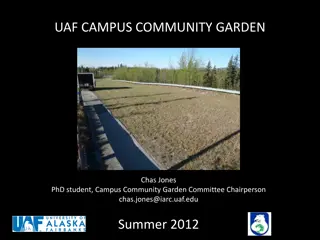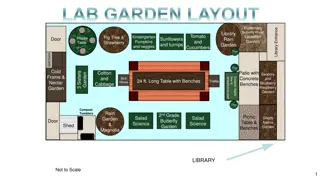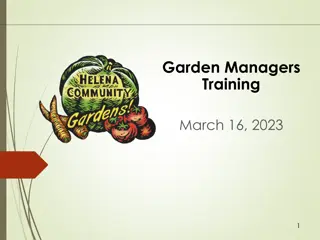Cultivating Beliefs: The Garden of Our Minds
In the garden of our minds, our beliefs are the seeds we plant and nurture. Just as we each have our unique soil, we develop beliefs about ourselves, others, and the world. We make decisions based on the strokes we receive from our environment, shaping our script. Reflect on the positive and negative beliefs you hold about yourself, others, life, and the world. Explore the dynamic interplay of these beliefs in defining our positions and interactions with the world.
Download Presentation

Please find below an Image/Link to download the presentation.
The content on the website is provided AS IS for your information and personal use only. It may not be sold, licensed, or shared on other websites without obtaining consent from the author. Download presentation by click this link. If you encounter any issues during the download, it is possible that the publisher has removed the file from their server.
E N D
Presentation Transcript
We might think of Script as the garden we grow. We might think of Script as the garden we grow.
We each are born with our own particular soil. We each are born with our own particular soil. In that soil will grow particular beliefs about ourselves, others and the In that soil will grow particular beliefs about ourselves, others and the world. world.
Much of this garden will be fruitful and beautiful. Much of this garden will be fruitful and beautiful. But some of it might be overgrown or covered in nettles or worse But some of it might be overgrown or covered in nettles or worse poisonous plants. poisonous plants.
We DECIDE what to plant and what to grow We DECIDE what to plant and what to grow what seems likely to be most successful in the ENVIRONMENT we are growing in. most successful in the ENVIRONMENT we are growing in. what seems likely to be Our SCRIPT DECISIONS are made in response to the STROKES available in Our SCRIPT DECISIONS are made in response to the STROKES available in our environment our environment Strokes are like the sun, rain and nutrients in our soil. Strokes are like the sun, rain and nutrients in our soil.
What beliefs have you developed (in childhood or beyond) about: Yourself Others Life and the world Think of one positive and one negative for each category .
I AM NOT OK I AM OK I am not OK & You are OK I am OK & You are OK YOU ARE OK Operation Operation Get-away-from (GAF) Get-on-with (GOW) Depressive Position Healthy Position I am not OK & You are not OK I am OK & You are not OK YOU ARE NOT OK Operation Operation Get-nowhere-with (GNW) Get-rid-of (GRO) Futility Position Paranoid Position The OK Corral-grid for what s happening; F Ernst, TAJ 1/4, 1971)
Script Matrix Mother Father You P P P A A A C C C Developed by Claude Steiner. Cited in Stewart & Joines, TA Today (1987) p.129. Redrawn by Rob van Tol, 2011. TA Student
When I constructed the script matrix, I found three channels of communication between parents and offspring to be foremost in importance: 1. Between Parent [of parents] and Parent [of a child]. The [drivers], namely those conventionally and openly held views about what people should do. 2. Between Adult [of parents] and Adult [of a child], the program, namely the way in which people teach their children how to do things. 3. Between the Parent in the Child [of parents] and the Parent in the Child [of a child], the [injunctions], namely that which the parents really want their children to do, injunctions and attributions that are covert, not openly stated, and usually disavowed by the parents. Claude Steiner (1972) Scripts Revisited, Transactional Analysis Journal, 2:2, 83-86
Script Matrix Potters Dursleys Harry P P P P A A A C C C Developed by Claude Steiner. Cited in Stewart & Joines, TA Today (1987) p.129. Redrawn by Rob van Tol, 2011. TA Student
Script Matrix Potters Dursleys Harry P P P P A A A C C C Developed by Claude Steiner. Cited in Stewart & Joines, TA Today (1987) p.129. Redrawn by Rob van Tol, 2011. TA Student
Script Matrix Mum Dad You P P P A A A C C C Don t feel Don t be close Don t grow up Don t be Don t belong Don t make it Note: Originally, the Program was shown as coming only from the same sex Parent as the child (as shown here). Now it recognised that both parents can transmit Program messages Woollams & Brown, Transactional Analysis (1978) pp.177. Redrawn by Rob van Tol, 2011. TA Student
Please Others Be Agreeable Be Strong Have Endurance Try Hard Be Energetic Be Perfect Be Excellent Hurry Up Have Speed Take it Go For It Petr ska Clarkson (1992) In Praise of Speed, Experimentation, Agreeableness, Endurance, and Excellence: Counterscript Drivers and Aspiration, Transactional Analysis Journal, 22:1, 16-20 Keith Tudor (2008) Take It : A Sixth Driver, Transactional Analysis Journal, 38:1, 43-57
Script Matrix Someone Another person You P P P A A A C C C PERMISSIONS + INJUNCTIONS - Note: Redrawn by Rob van Tol, 2011. TA Student
Thinking Critically One way arrows are overly deterministic (too predictable) There are many more influences on a person than their parents Influences on Script can obviously occur throughout our lives Injunctions and drivers will fit people better if they reflect their actual experiences Models of script are largely based on the Theoretical Infant rather than the Observable Infant
Script Helix Female Scottish P P A A C C P P P A A A C C C Protestant Catholic P P A A Adapted from Summers & Tudor, in Cornell & Hargaden. From Transactions to Relations (2005) p.119 Redrawn by Rob van Tol, 2011. TA Student C C Irish Female
Script beliefs developed by Harry Potter? Positive? Neutral ? Negative? Himself I deserve better than this. I am a good person. I have to fight for what I need and want. People are out to get me. It s all my fault Others There are good people and bad people; I know the difference. I was loved Don t trust easily some people seem to be on my side but they might not be . Life and the world There is a big world out there. I have a right to it. I am an outsider in it At what age did he develop these beliefs. Did his Script change over the course of the story? Does life script keep changing as we grow and develop?
Script System Script System Script Beliefs / Feelings Script Displays Reinforcing Memories Beliefs About 1 Self 1. Observable Behaviours (stylised, repetitive) Emotional Memories ( Trading Stamps ) Provide Evidence and Justification 2 Others 2. Reported Internal Experience (somatic aliments, physical sensations) 3 Quality of Life 3. Fantasies (Best & Worst) (Intrapsychic Process) Feelings Repressed at the Time of Script Decision Developed by Richard Erskine & Marilyn Zalcman, cited in Stewart & Joines, TA Today (1987) p.221 Redrawn by Rob van Tol, 2011. TA Student
Autonomy System Autonomy System Revisited beliefs / Feelings Autonomous Expressions Positive Memories Beliefs About 1 Self 1. Observable Behaviours Collecting Positive Memories 2 Others 2. Identifying and accepting internal effects in your body. 3 Quality of Life 3. Developing and stimulating positive fantasies and visualisation (Intrapsychic Process) Authentic Feelings Redrawn by Rob van Tol, 2011. TA Student
Harm Self I AM NOT OK I AM OK I am OK & You are OK YOU ARE OK What do I do if it becomes unbearable? Operation Get-on-with (GOW) Healthy Position YOU ARE NOT OK Harm Others Go Crazy
Even a script generated under the worst environmental circumstances contains within itself the Child's own genetic intuitions as to how he might fulfill his inner goals creatively, if certain malevolent fairies and cobwebs can be neutralized. Without a script, the Child ego state would be operating only out of a vacuum of time and space within which there would be no content from which to connect the past to the future, so he would be rootless, like a leaf in the wind. (Fanita English, 1977, p. 290 quoted in William F. Cornell (1988) Life Script Theory: A Critical Review from a Developmental Perspective, Transactional Analysis Journal, 18:4, 270-282)




